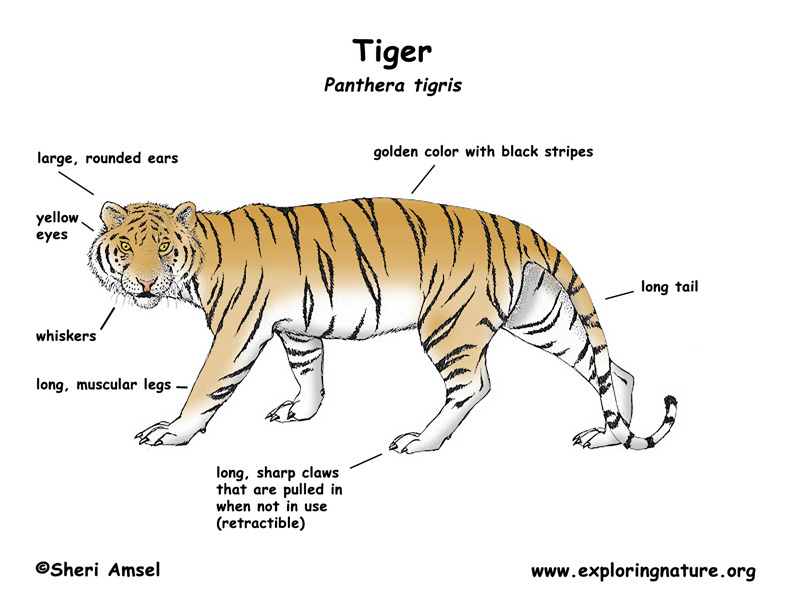

There are 5 different kinds of tiger alive today. The tigers are the Siberian tiger found in Russia, China, and North Korea, the Indochinese tiger found in Burma, Vietnam and Malaysia, the South China tiger found in South China, the Bengal tiger found in India, Nepal, Bhutan, Bangladesh, Western Burma, and Tibet, and the Sumatran tiger found in Sumatra.
They live in tropical forests, pine forests, mangrove swamps, grasslands, and open rocky hillsides. Their habitat just needs places to hide, so they can stalk and leap on prey.
They are the biggest cats in the world. The Siberian tiger is the biggest kind (species) weighing up to 800 pounds and up to 12 feet long. They have golden, orange fur with black striping and sensitive whiskers. Their claws are only out when in use (retractable). They have huge, powerful jaws for crushing prey. They are adapted for leaping onto prey with large back legs and a long tail for balance.
They live alone (solitary) and need a lot of space. They are good swimmers.
They eat deer, antelope, monkeys, lizards, snakes, fish, young elephants, cattle, peacocks and even fruit and berries (carnivores).
Their only real threat is man.
Females are pregnant for about 14 weeks (a little more than 3 months) (gestation). They have 1- 6 cubs, usually 3. At 8 weeks old, the mother begins to take the cubs out into the bush to feed on the prey she has killed. They don't start killing prey until they are well over a year old.
They can live 10-15 years in the wild. They are listed as endangered.
Kingdom: Animalia
Phylum: Chordata
Subphylum: Vertebrata
Class: Mammalia
Order: Carnivora
Suborder: Feliformia
Family: Felidae
Subfamily: Pantherinae
Genus: Panthera
Species: Panthera tigris
When you research information you must cite the reference. Citing for websites is different from citing from books, magazines and periodicals. The style of citing shown here is from the MLA Style Citations (Modern Language Association).
When citing a WEBSITE the general format is as follows.
Author Last Name, First Name(s). "Title: Subtitle of Part of Web Page, if appropriate." Title: Subtitle: Section of Page if appropriate. Sponsoring/Publishing Agency, If Given. Additional significant descriptive information. Date of Electronic Publication or other Date, such as Last Updated. Day Month Year of access < URL >.
Amsel, Sheri. "Tiger" Exploring Nature Educational Resource ©2005-2024. December 13, 2024
< http://www.exploringnature.org/db/view/Tiger >


